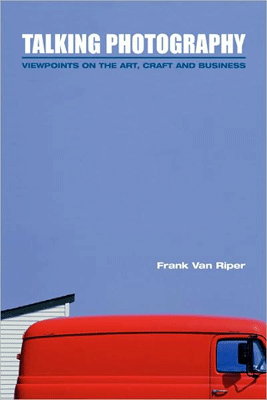“Award-winning photographer and Washington Post columnist Frank Van Riper assembles a collection of his most outstanding popular columns to delight readers with a treasure chest of photographic insights” one reads on the back cover of this book. Okay then, let’s look what the author’s photographic insights are. It goes without saying that there are different ways of reading a book. From cover to cover is a possibility, to open it at random and start reading when and where you feel like it is another one. In the case of this tome I’ve opted for the second one. And I did indeed find “a treasure chest of photographic insight” that made me re-think some of my views. Here’s an example: Although I’ve never thought that
photographs, as some critics seem to believe, should be read as
texts (why pictures should be declared texts is beyond me), I’ve
nevertheless often used (without giving it too much thought, I
readily admit) the expression ‘reading photographs’ until
I came across this quote by Neil Selkirk (‘Seeing and Shooting
by Instinct’): “The process of looking is more akin
to smelling or tasting than it is to reading … One’s
response is immediate and instinctual, more like a reflex which
disposes with the conscious brain as being too cluttered and lacking
in spontaneity.” Under
the title “Stephen King, Photography Teacher” Van
Riper refers to Stephen King's On Writing, a book that he calls “an
insightful, plainspoken, and thoroughly enjoyable book on photography”.
By this he means that what King says about writing could just as
well be said about photographing. For instance: King advises fledgling
writers to read voraciously for reading “is the creative
center of a writer's life.” Van Riper comments: “I
would say here that looking at, studying, and absorbing good photography
serves the same purpose for a beginning photographer. That is because
learning the components of a good image - composition, lighting,
gesture - and seeing those elements used differently over and over
by different masters, makes it easier for a person to achieve the
same end on his or her own over time. And there is simply not alternative
to this, no shortcut.” Van Riper also points out that “nowhere in his book does King have anything to say about ‘equipment’. From my own conversations with him I know that he writes on everything from a computer to the back of napkins. Keep this in mind the next time you are tempted to think that your creative output would be doubled if you just spent the rent money on a better camera. Better you should spend a fraction of that total on a few more photography books so you can study the images therein to better use the camera you already have." Good advice, I'd say. Another piece is called “In Praise of Obsession”. Since I’ve never thought of obsession as being something positive (quite the opposite, actually), I wondered what this would be all about. Van Riper elaborates: “We as photographers, especially commercial shooters who are hired guns for every passing art director, event planner, magazine or ad agency, may think we haven’t the time for such artistic indulgence, especially when we face hard times and the need to make a living. Yet I suggest that the photographer who thinks this way is limiting him- or herself in a fundamental and important way. The project that speaks to us directly – that stays in the back of our minds at the end of a boring day of tabletops or assembly line headshots – is the one that will maintain our sanity in the humdrum of commercial shooting. Succumbing to obsession, I submit, is a way to stay sane.“ Great insight, isn’t it? “Photography, like painting, is largely learning how to see”, notes Van Riper on another occasion and continues, “and to grow comfortable with the equipment that lets us turn what we see into something tangible.“ It is such well put insights that I’m looking for in books. “Talking Photography” consists of 99 articles (including the introduction) and covers a very wide range of topics from interviews (i.e. Bruce Davidson, Frans Lanting) to reviews (i.e. Dorthea Lange’s Ireland, Edward Steichen: Diminished by his Success, Henri Cartier-Bresson and Brassai: Two Different Ways to Greatness) to technical tips (i.e. Photographing Artwork, Capturing Venice at Night) and more. What did I like best about this useful and recommendable tome? The nuggets that I encountered here and there and everywhere. Here are two additional examples. Number one: “Put simply: A painter can create an image from memory; a photographer cannot. For this reason photography has gained a reputation for truth telling (‘the camera never lies,’ though in fact the camera alway lies by translating a three-dimensional image into one of only two dimensions). Number two is a title and it still makes me smile: “Stieglitz and New York: A Town to Match His Ego.
|

